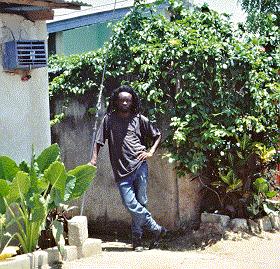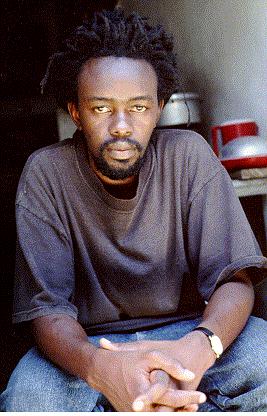
Ras Inno in his backyard

Ras Inno's real name is Innocent Nganyagwa. He is originally from Dar, but has also lived in Iringa in Southern Tanzania and Tanga in Northeastern Tanzania. Already in 1982 when he was 17 years old he heard of Bob Marley and started to listen to reggae. In 1989-90 he turned to music seriously, learnt the guitar and started to compose music and write texts. He is now playing bass guitar and sings. He has no band, but team up with session musicians for live gigs and recording sessions.
He performs live 8-12 times in a year. It is expensive to rent instruments, pay for
marketing and promotion etc. He also shares the difficulties to market recordings with
other musicians in Tanzania:
After I finished recording the studio gives me the master
tape. It's up to me to look for anyone who can buy my songs and
serve them to the people who want to buy them. We have no
special system of serving and buying records from artists.
That's we may have a very good song, maybe very popular
through media, people see you always on TV, hear you always on
radio, there is so much written in the newspapers, but you
are just another guy like all other guys. One of the
musicians. That's our basic problem.
Ras Inno has made a few songs in Swahili, but usually they are in English. About his
musical style he says:
It sounds different from Jamaican reggae and European reggae,
even different from South African kind of reggae. If you
listen to my songs they have something Tanzanian in them. They
are songs that can make anyone listen.

When asked what it means to be a rasta in Tanzania he says:
In Tanzania you may find many different explanations. A
lot of misunderstanding. They think it's just smoking ganja.
You even find different groups of rastas. These can't cope with
these etc. Because those don't believe in what these are believing
in and these don't believe what those are believing in. There
are some rules that applies to the way you live.
Like a lot of rastas here think when you are a rastafarian
you don't have to be smart. I don't believe in that. Have you
tried to move around in town? You find different kinds of
rastas. When you're smart you're not rasta to them. When I say
smart, I mean not walking smoking ganja in public, if I meat a
policeman I don't care. I'm a rasta man, I'm allowed to smoke.
Some takes it that way. When it comes to music some say if you
sing some subject in music that maybe is going contrary to
rasta beliefs you're not rasta to them.
I sing a lot about children. I say it's a lot of street
children because of unplanned parenthood. Some people say "No,
you're not rasta. You're talking to us about planning
parenthood." That's something not rasta. But I know it's a lot
of street children because of that thing and I sing. Should
you be a reggae musician for the rasta or a reggae musician
for the whole society?
If you talk to Jah Kimbute or some other he would tell you his views in a different way. I want
more people to be rasta and one way to do this is to make them
close to me by singing about their day to day life, day to day
problems. My main problems are the problems facing all
Tanzanians in their day to day living. We have a lot of
hardships, economical and so on. I cannot say because I'm a
rasta I'm allowed to do this, because then everybody is allowed
to do anything.
Here a sample from Gila (.wav format 730 kB) in Ras Innos typical layed back style.
|
TO THE SCENE IN DAR |
|---|
 |
|---|